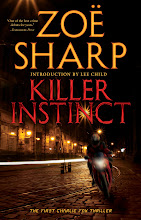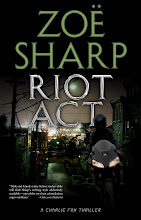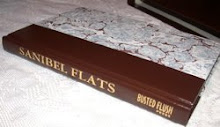 Just Enough Light to Kill (by A. E. Maxwell; 978-0-935415-02-2; trade paperback reprint; $14) On sale in about a week.
Just Enough Light to Kill (by A. E. Maxwell; 978-0-935415-02-2; trade paperback reprint; $14) On sale in about a week.EVERYTHING STARTED COMING apart on Uncle Jake’s birthday, or what would have been his birthday if somebody hadn’t put two bullets through the back of his head with a .45-caliber Colt semiautomatic pistol. I don’t draw black borders around his birthday on the calendar or anything like that; Jake lived and died pretty much the way he wanted to. But I do remember the day and the dirt road south of Puerto Peñasco because I was there on that dusty road with Jake. Actually, I was only about half-there. The other half was already headed for what my poor Montana mother—Jake’s sister—used to call “a better place.” The guy who shot Jake shot me first. I guess I looked like more of a threat since I was bigger and wasn’t stoned. But if I was such a big threat, why didn’t he waste a second round on me, the way he did on Jake?
Hell of a question to ask yourself when you’re ass-deep in a hole the size of a grave.
I was half-done with the excavation for a new koi pond. The fish had grown too big for the old one. All eight of them had to swim in tight formation or their maneuverings looked like a watery version of Destruction Derby. Even when they managed the close-order drill, Lord Toranaga frayed his fins on the concrete. Every time I looked at him, I felt guilty. I should have been shoveling a lot sooner.
Digging the new pond had been put off all summer. The ground was too dry, too hard, I kept telling Fiora. No sense in using dynamite when the winter rains will do the job for you. When the rain finally came, it was too wet, of course, and I had to wait a week for the soil to dry out a bit. Then it would rain before I could start digging, so it was wait and dry out, and then the rain came again. You’d have thought I had Mother Nature on a retainer. All through December and January, the storms came through on a perfect seven-day cycle that kept my excuse fresh.
But finally, on Jake’s birthday, the game lost its savor. Fiora was too busy trying to take over a local investment bank to notice what I was or wasn’t digging. In fact, she was so busy she barely had time at dawn to remind me that my tux had been cleaned and pressed and would I please appear in it at 7 P.M. on Pacific Coast Highway in front of Savories Cafe. Then she kissed me in a half-assed, distracted way, patted my cheek and hopped out of bed before I could grab her.
When I woke again hours later, I was feeling surly as hell. I told myself it was a combination of Jake’s day and having to wear a tux tonight. A brisk run along the beach didn’t help to shake out my mental kinks. Neither did sitting on my butt. So I sharpened the spade, went up the little rise in back of the cottage and took out my frustrations on something inanimate.
An hour after I sliced out the first chunk of grass and clay, the raw wind off the water picked up, promising the arrival of another storm. The cold wind was what got me thinking about Jake and the border. The wind had been blowing that day, too. I had turned my shoulder against the stinging sand, only to realize an instant later that I’d made a mistake because I caught a glimpse of Refugio turning toward me with the .45 in his hand.
Oddly, I never heard the shot that hit me, although I did feel a hard blow on the back of my head. But I heard the two shots that were for Jake. In my mind I watched him move off slowly, disappearing into the bright light of the overhead sun, the wrong-century cowboy headed for the place he loved best, the shimmering, beckoning border between what has been and what will be. . . .
Jake always had loved crossing boundary lines. His favorite was the U.S.-Mexican border. I sometimes think he was a smuggler because he loved the border. It ran through his life like a black silk thread, stringing together all the bright possibilities from here to tomorrow. On this side of the border, everything is ordinary; on the other side is the Mexico of the soul—uncharted territory, blistering chili peppers and .45 slugs.
Why are they trying to kill us, Jake?
That was just one of the haunting questions that swirled around me like the cold February wind as I turned over spade after spade of dirt. I really should have remembered a few other things about the border when I switched to a round-edged shovel, looked up and saw the clouds scudding inland to pile up against the mountains like great white grave markers. I should have remembered, but I didn’t. I plead guilty to oversight. After all, I thought I was just digging an ordinary hole in the ground.
Actually, Kwame Nkrumah and I were digging the hole together. Kwame is the princely black and tan Rhodesian Ridgeback that lives next door. Technically, Kwame belongs to Dr. J. Samuel Johnson, a black dentist who has one of the most lucrative orthodontics practices in Newport Beach. But Kwame is convinced that Joe Sam doesn’t really understand or appreciate him. Kwame is right. Joe Sam hasn’t a clue about real watchdogs, because he is one of the nicest people I’ve ever met. He hasn’t a single enemy, despite the fact that he hurts people for a living.
I hurt people once in a while, too. It’s just as unavoidable in my line of work as it is in Joe Sam’s, only some of my patients try to hurt back. That’s why Kwame hangs around with me. I don’t shush him or tell him to go lie down when he starts making a spine-chilling noise deep in his chest and lifts the loose folds of his lips to reveal gleaming fangs. I also don’t mind when Kwame just pals around with me, getting underfoot, watching everything I do as though it mattered. Let’s face it: digging a grave-sized hole in a cold wind is a lonely way to pass the time.
As I dug, Kwame was in pal rather than guard dog mode. We were getting deeper into the little hill with each stroke of the shovel. About every third time I turned over a shovel load, Kwame would sniff, make a few passes with his toenails and watch intently. When nothing came out to play, he’d flop belly down on the fresh clay and wait for me to turn over something that wiggled. I’d look up from time to time to find him watching me with those clear, dark, calm eyes.
He had just finished his little ritual of scratch and flop when I became vaguely aware of a restless feeling. Kwame felt it, too. He got up, circled the bottom of the hole once and flopped back down. He was up again almost instantly. This time he went to the edge of the waist-deep hole and begged to be excused.
“Fine,” I grunted. “Go home to your warm bed.”
Kwame looked at me earnestly, then stretched up the side of the hole on his hind legs, and looked at me again.
The dirt was piled almost eye-high on that side, but he could have easily scrambled out any of the other sides, so I ignored him.
He whined very softly, deep in his throat.
Kwame’s not the type to complain. I bent over and boosted him out. He could have made the welterweight class, with a pound or two to spare. He didn’t pause to say thanks. He scrambled up the pile of dirt and stood stiff-legged. The hair on the back of his neck raised in a silent flag of warning. In case I had missed the message, he made the low, tectonic sound in his chest.
The hair on the back of my neck rose in reply. I slipped out of the hole in a single motion, but carefully stayed behind the pile of clay and stones that rose between me and whatever had lit Kwame’s fuse.
At first it looked like just another day in paradise. The fifty turn-of-the-century cottages that made up Crystal Cove were as ramshackle and unthreatening as they had ever been. The open pastureland beyond was as calm and bucolic as ever. The whole scene presented a picture of rustic serenity that would have been hard to beat.
Kwame wasn’t buying it. He growled again and held his ground, facing the highway. He was staring toward the turnout below an orange juice stand that had been built in 1931 and looked like it hadn’t been painted since.
Easing around slightly, I got a look at what interested Kwame. One hundred fifty yards away, a blue car sat broadside to me. The car’s nose was pointed down the coast toward Laguna.
There was something innocuous and nondescript about the car, as though it were a rental or part of somebody’s corporate fleet. Beyond the fact that the driver sat alone in the front seat, I was too far away to see anything useful. The guy was probably just a tourist who had pulled over to watch the steel-gray Pacific on a choppy, windy winter day.
Except that this particular tourist seemed to be looking back up the coast toward Crystal Cove rather than out toward the restless ocean.
Even after a soft word from me, the African prince wouldn’t budge. No longer growling, Kwame stood with his feet rooted in the clay, his neck ruff as spiked as a punker’s Mohawk. I’m not one of those guys who asks for expert advice and then ignores it, so I eased back down into the hole and rolled out the other side, right into the cover of a bottlebrush hedge. Keeping the hedge between me and the highway, I duck-walked down the rise toward the cottage.
By sliding under the side porch, I managed to keep out of sight of the turnout until I could round the corner of the cottage and get in through the side door with a minimum of fuss. Fiora keeps a pair of Nikon zoom binoculars near the picture window, the better to count the oil tankers passing on the far side of Catalina Island. I grabbed the glasses and headed for the back bedroom, which faced the highway.
The curtains are always closed back there. I didn’t want to disturb them; if the guy had been watching the house for any time at all, he would be waiting for just such a sign of life inside. That left only one way for me to get a clear view of the turnout. I went into the bathroom, lowered the toilet lid and stood on it to peer out through the narrow louvered window. The zoom lever on the binoculars was down at seven power. When I racked it up the scale, I almost fell backward into the sink. The increased magnification was so great I could damn near read the brand name on the hinge of the guy’s binoculars.
He was looking right at me.
---------------------------------
Named by Time magazine as one of the best suspense novels of the year!
“Plan on reading this one all the way through. You won’t be able to stop.”—United Press International
“A. E. Maxwell writes sophisticated, charming, and literate thrillers. I haven’t had this much fun since reading Nick and Nora Charles.”—Robert Ward, author of Total Immunity
“Fiddler is to California what Spenser is to Boston and Travis McGee is to Florida. Tough, smart guys who know that sometimes, what looks like paradise, is pure hell.”—Paul Levine, best-selling author of Solomon vs. Lord and Illegal
----------------------------------
Just Enough Light to Kill is the fourth novel in A. E. Maxwell's Fiddler & Fiora crime series, following Just Another Day in Paradise, The Frog and the Scorpion, and Gatsby's Vineyard.































.jpg)


No comments:
Post a Comment